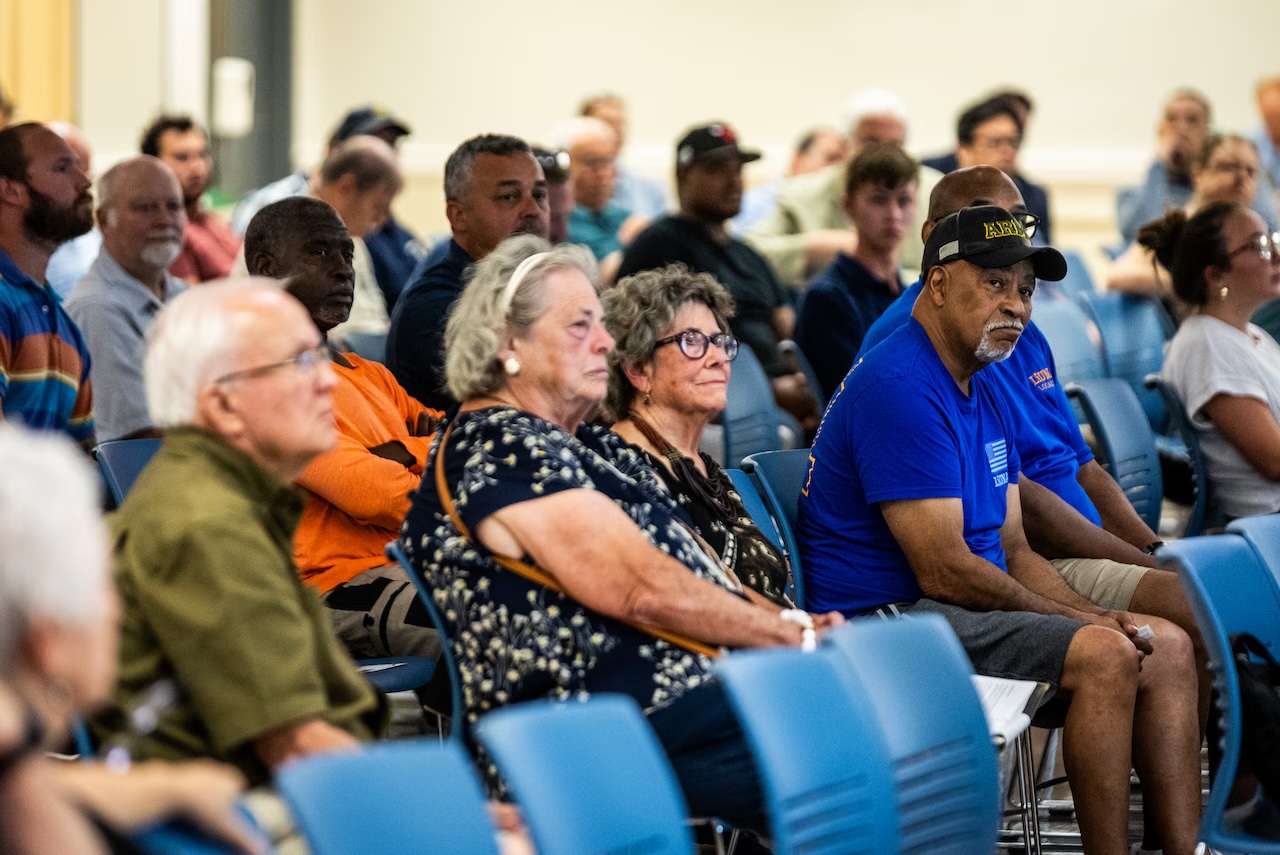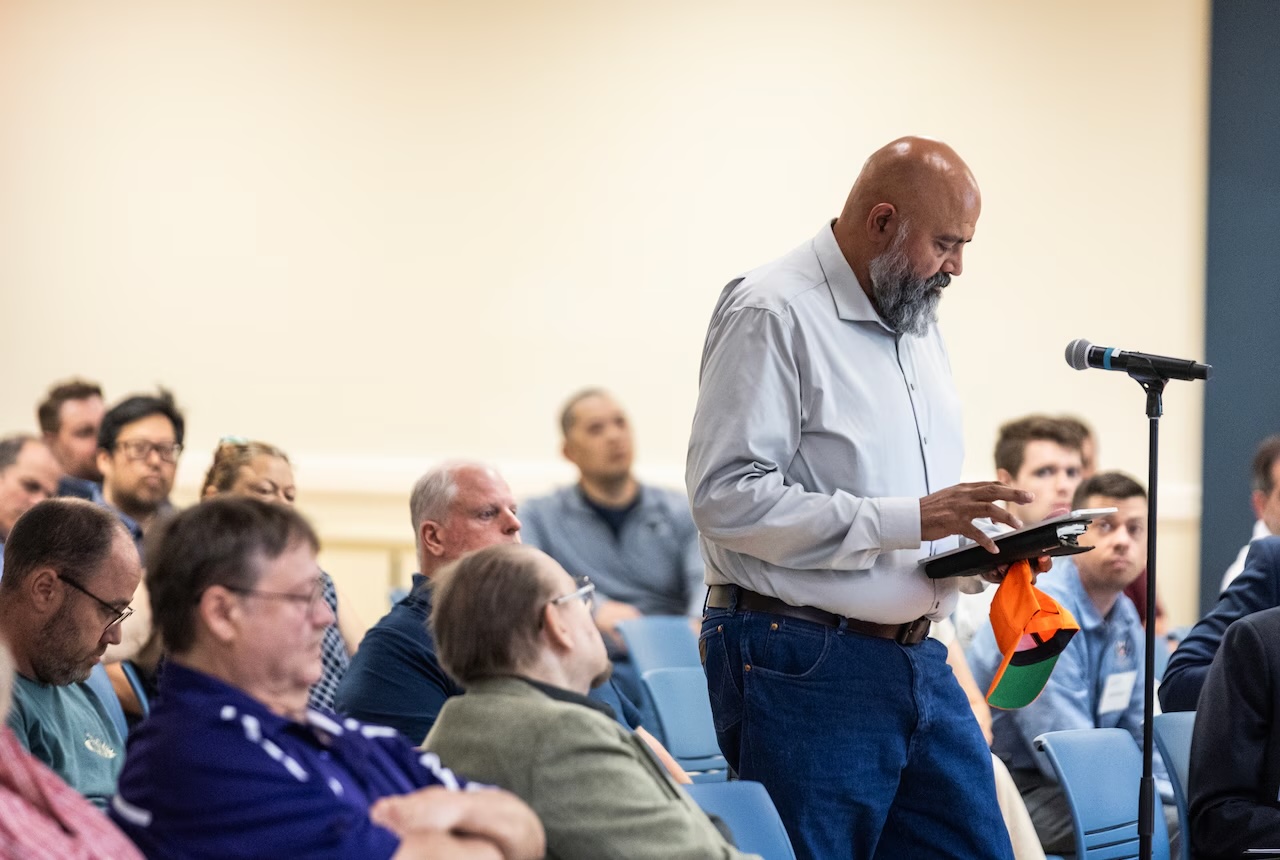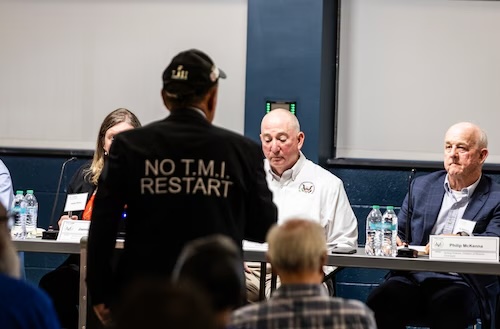‘Do it right, do it safe’ outweighs ‘don’t do it’ at public meeting on TMI restart
‘Do it right, do it safe’ outweighs ‘don’t do it’ at public meeting on TMI restart
NRC holds its first public meeting about the TMI restart
By Charles Thompson | cthompson@pennlive.com
If there was any takeaway from the Nuclear Regulatory Commission’s first public meeting on the restart of the nuclear power station at Three Mile Island, it may be this:
Forty-six years out from the nation’s worst-ever commercial nuclear accident, the days of widespread opposition to the very idea of nukes in the midstate seem over.
But what has stuck is a well-informed, highly-concerned minority that will do its level best to make sure regulators hold plant operators to the highest standards of operational safety, environmental protection and emergency preparedness.
As one example, representatives of the NRC’s Crane Clean Energy Center Restart Panel were repeatedly grilled Thursday night at Penn State Harrisburg with concerns about how the growing Capital Region could be evacuated swiftly and safely in the event of another emergency.
Crane refers to the new name that plant owner Constellation Energy has bestowed on the generating station.
“We need to see a realistic evacuation plan when Crane restarts this reactor at Three Mile Island because we did not have a realistic evacuation plan on March 28th, 1979,” said Larry Arnold, of Susquehanna Township.
Anti-nuclear activist Gene Stilp went so far as to predict before the meeting that those safety concerns would be the Achilles’ heel that keeps the plant from reopening.
There were also repeated concerns about the ability of the NRC to play a watchdog role in a Trump administration that is prioritizing deregulation and its own version of governmental efficiency.
“I know you have a lot of job openings (at the NRC). You haven’t been able to fill those,” said Lebanon County resident Maureen Mulligan. “I’m concerned that you’re not going to be adequately staffed.
“The mission has changed under the (Trump) Executive Order and the Advance Act,“ she said, referring to a 2024 bill designed to expedite development of advanced nuclear technologies. “And it’s very concerning that you’re going to be able to meet all these goals, especially when there’s a shift from safety to licensing and relicensing.”
The NRC reps conceded they can never guarantee that there will never be another major accident at any nuclear plant.
But they were adamant that safety remains their top priority.
“We are not going to accept just paperwork,” said Erin Carfang, one of the co-chairs of the Crane restart panel and a director of plant inspection efforts.
She had earlier estimated that the reborn Three Mile Island Unit One would receive about 7,500 hours worth of on-site inspection and plan review.
”We need evidence. ... We are going to go put our eyes on what is in the field to make sure the plant is ready to restart and it is safe for all of you.“
Carfang also tried to assure the room that the regional inspections division she heads has adequate staffing for the unique challenge ahead, noting some are actually delaying retirements to be part of the effort.
“These are some of the most senior people in the agency who have been with us for 40 years. They have a lot of experience, and they know this site very well, and they were there before, and they want to be there to ensure it is safe to restart,” Carfang said.
As for evacuations and emergency preparedness, the panelists noted there’s a lot of joint responsibility for that, starting with all-hazard emergency management plans developed by local and county governments, to be followed by a graded exercise.
Another undeniable takeaway from Thursday is that — safety concerns notwithstanding — there is a lot of support for the reopening.
“With the reopening of the island as Crane Clean Energy Center, hundreds of jobs are available again. And for some families who had to leave when the island closed, they are moving home,” said Ellen Willenbecher, a Middletown borough council member.
“Local businesses can welcome back old and new customers. And community projects who serve residents may receive critical support. And all with low-carbon energy. I love saying that.”
Union member Tyrone Thomas said, after more than 40 years of mostly safe operations at Unit One, the restart is a calculated risk worth taking for the hundreds of families who stand to benefit.
That 1979 accident, in a footnote that is of vital importance to anyone affiliated with Unit One, occurred at TMI Unit Two, a separate station on the island.
The Unit Two reactor has been closed since the accident, and is currently in the early stages of a long-term decommissioning project led by Energy Solutions, of Salt Lake City, Utah.
“There’s no hundred percent guarantee that we won’t have another accident, no. There’s no hundred percent guarantee that something won’t go wrong,” Thomas said.
“But all we can do is plan based upon the knowledge we have to make it as safe as possible.”
Thursday’s was not a formal hearing; those will come over the next two years as Constellation Energy’s restart bid proceeds.
Constellation announced last year it wants to reopen the old TMI Unit One, which the company’s corporate forefathers shuttered in 2019 for economic reasons.
A technology-driven sea change in U.S. energy demand has changed that paradigm.
In TMI Unit One’s case, Microsoft signed a 20-year commitment to buy the equivalent of all the wattage produced by the restarted nuclear plant, guaranteeing Constellation’s projected $1.6 billion investment in the restart will be profitable.
Constellation has already held several public updates on its work toward the restart.
But Thursday’s meeting marked the first time the NRC - which ultimately holds federal government approval power over the project - held an open meeting expressly for the public on the restart.
Even here, the political and economic pressure surrounding the issue was unavoidable, as restart proponents organized a rally in support of restart on the Penn State Harrisburg campus, outside the meeting hall.
Inside, the commission used a ticket system to randomly select audience members for the chance to pose questions and/or comments to the NRC staff.
- Log in to post comments





